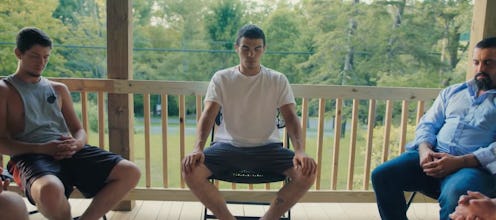A new Netflix documentary called Recovery Boys, out June 29, provides a rare look into four men's time in rehab while recovering from opioid addictions. Their rehab probably isn't what you picture when you think of that word, though. The film's recovery center, called Jacob’s Ladder, uses farming and community to help people overcoming their opioid addictions. Jeff, Ryan, Rush, and Adam, all make their way through the program before re-entering society in West Virginia. And where the Recovery Boys are now in 2018 shows just how far they've come since their addictions took hold.
These days, the men are back home, and it sounds like they are finding their footing after leaving Jacob's Ladder. In an interview with The Guardian, both Ryan and Rush confirmed that they're staying sober and even looking forward to the documentary's release. Ryan called his town of Morgantown, West Virginia a "huge community of recovery," and it sounds like Recovery Boys can only help strengthen that bond. Meanwhile, Rush told The Guardian, "My hope for this documentary is that it de-stigmatized the addict... everybody thinks of the guy under the bridge with the tattoos, the beard. We’re not just all bad people. We are good people inside.”
The movie succeeds in humanizing those affected by the opioid crisis, which involves record-breaking rates of overdoses from heroin and prescription painkillers. In January, President Trump instated a 90-day public health emergency, as Politico reports, in order to respond to the opioid use that had caused West Virginia to have the highest drug overdose death rate in the U.S.. Although public health officials reported to Politico that nothing had changed after Trump's emergency order, projects like Recovery Boys will help people understand the opioid crisis from an intimate perspective.
Recovery Boys' director Elaine McMillion Sheldon, who is from West Virginia, previously made an Oscar-nominated short documentary called Heroin(e), which focused on three women working on the frontlines of the opioid crisis. In an interview with Gold Derby, McMillion Sheldon explained, "I know [the opioid crisis] in a very personal way," adding that she wishes to make films about “the people on the ground actually working towards change every day."
The founder of Jacob's Ladder, Dr. Kevin Blankenship, created the rehab center and its 18-month program to offer an alternative approach to helping people recover from opioid addictions. For the participants, the rehab felt like a much-needed change. "I went through overdoses and car wrecks, and I was jailed a couple times but I didn’t want to give up,” Ryan explained in the doc. “I had to find something. And it turned out it was Jacob’s Ladder.”
In addition to highlighting the benefits of a program like Jacob's Ladder, though, Recovery Boys also shows how difficult life for a former addict can be once rehab ends. A statement on McMillion Sheldon's website reads, "After rehab, [the men in Recovery Boys] experience life's trials and tribulations sober, but struggle to find their place and purpose in an often unforgiving society. In today’s world, where shocking statistics about the opioid crisis make headlines daily, Recovery Boys gives a deeply personal look into the unseen lives of those working toward transformation."
While the effects of the opioid epidemic might feel distant to some viewers of the new doc, the stories shown in Recovery Boys will feel incredibly relatable — after all, everyone's had to overcome struggles at some point or another. Watching the four men featured in the Netflix documentary deal with their issues head-on is truly inspiring, as is their commitment to staying clean and living well in the time following their rehab stays.
Editor's Note: A previous version of this article incorrectly described the plot of Heroin(e).
